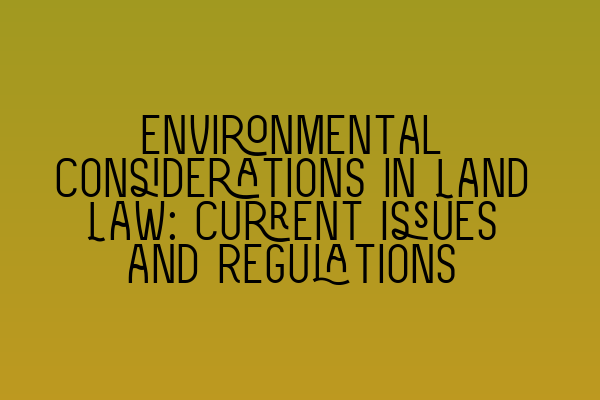Environmental Considerations in Land Law: Current Issues and Regulations
As the world becomes more conscious of the environmental impact of human activities, the legal landscape in land law is continuously evolving to address these concerns. Environmental considerations have taken center stage in recent years, and it is essential for property lawyers to stay abreast of current issues and regulations in this area. In this blog post, we will explore some of the key environmental considerations in land law, highlighting the importance of these factors and the regulations that govern them.
1. Environmental Impact Assessment (EIA)
One of the fundamental aspects of environmental consideration in land law is the requirement for an Environmental Impact Assessment (EIA) before any development project can be approved. An EIA ensures that the potential environmental consequences of a project are thoroughly assessed and mitigated. It encompasses various factors, such as the impact on air, water, and soil quality, wildlife, and habitats. The aim is to strike a balance between development and environmental preservation.
In practice, property lawyers play a crucial role in advising clients on the necessity of an EIA, guiding them through the assessment process, and ensuring compliance with the relevant regulations. It is crucial to work closely with environmental consultants and regulatory bodies to secure the necessary permits and clearances before proceeding with development plans.
2. Climate Change and Sustainable Development
In a world wrestling with the effects of climate change, sustainable development has become a key concern in land law. Governments and regulatory bodies are increasingly pushing for environmentally friendly practices and renewable energy solutions. As a property lawyer, understanding the implications of climate change regulations and sustainable development goals is essential to navigate the legal complexities of land transactions and development projects.
Ensuring compliance with energy efficiency standards, reducing greenhouse gas emissions, and incorporating renewable energy technologies are just a few examples of the environmental considerations that now factor into land law. It is important for property lawyers to keep themselves updated on the latest regulations and guidelines in this field to provide comprehensive advice to their clients.
3. Contaminated Land
Dealing with contaminated land is another critical aspect of environmental consideration in land law. Contamination can arise from historical industrial activities, improper waste disposal, or accidental spills. It poses potential risks to human health and the environment, and property lawyers must be well-versed in the laws and regulations governing the management and remediation of contaminated sites.
Conducting thorough due diligence, including environmental searches, is crucial in identifying potential contamination issues before property transactions take place. By working closely with environmental experts, property lawyers can help clients navigate the complexities of contaminated land, negotiate appropriate remediation obligations, and ensure compliance with relevant regulations.
4. Biodiversity and Conservation
Preserving and protecting biodiversity and natural habitats is a crucial environmental consideration in land law. There are regulations in place to safeguard designated wildlife sites, protect endangered species, and promote biodiversity conservation. Property lawyers must be knowledgeable about these regulations to ensure that any proposed development projects adhere to the necessary environmental safeguards.
Incorporating measures to protect and enhance biodiversity, such as creating wildlife corridors or implementing sustainable landscaping practices, can help strike a balance between development and conservation objectives. Property lawyers can guide their clients in understanding the legal requirements and implications of biodiversity protection and ensure compliance with related regulations.
Conclusion
Environmental considerations have become increasingly important in land law. From Environmental Impact Assessments to climate change regulations, contaminated land management, and biodiversity protection, property lawyers have a vital role in advising their clients on navigating the legal complexities of these issues.
Staying updated on the latest regulations, working closely with environmental experts, and conducting thorough due diligence are all crucial in ensuring compliance and mitigating any potential risks. By integrating environmental considerations into land law practices, property lawyers can contribute to sustainable and responsible development while protecting the environment for future generations.
Related Articles:
– SQE 1 Practice Exam Questions
– SQE 1 Practice Mocks FLK1 FLK2
– SQE 2 Preparation Courses
– SQE 1 Preparation Courses
– SRA SQE Exam Dates
